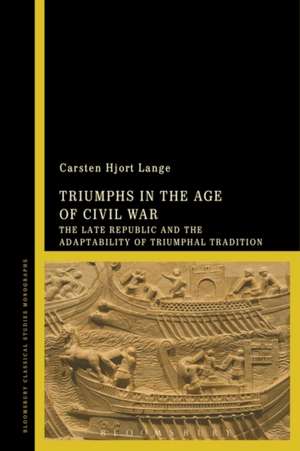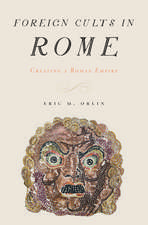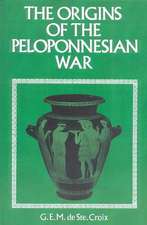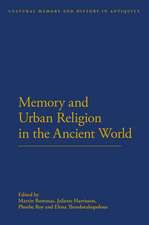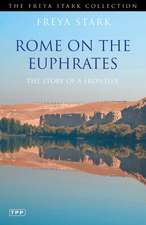Triumphs in the Age of Civil War: The Late Republic and the Adaptability of Triumphal Tradition
Autor Dr Carsten Hjort Langeen Limba Engleză Hardback – 10 aug 2016
| Toate formatele și edițiile | Preț | Express |
|---|---|---|
| Paperback (1) | 240.23 lei 6-8 săpt. | |
| Bloomsbury Publishing – 24 ian 2018 | 240.23 lei 6-8 săpt. | |
| Hardback (1) | 834.70 lei 6-8 săpt. | |
| Bloomsbury Publishing – 10 aug 2016 | 834.70 lei 6-8 săpt. |
Preț: 834.70 lei
Preț vechi: 1199.13 lei
-30% Nou
Puncte Express: 1252
Preț estimativ în valută:
159.72€ • 167.21$ • 132.16£
159.72€ • 167.21$ • 132.16£
Carte tipărită la comandă
Livrare economică 05-19 aprilie
Preluare comenzi: 021 569.72.76
Specificații
ISBN-13: 9781474267847
ISBN-10: 147426784X
Pagini: 352
Ilustrații: 20 bw illus
Dimensiuni: 156 x 234 x 24 mm
Greutate: 0.66 kg
Editura: Bloomsbury Publishing
Colecția Bloomsbury Academic
Locul publicării:London, United Kingdom
ISBN-10: 147426784X
Pagini: 352
Ilustrații: 20 bw illus
Dimensiuni: 156 x 234 x 24 mm
Greutate: 0.66 kg
Editura: Bloomsbury Publishing
Colecția Bloomsbury Academic
Locul publicării:London, United Kingdom
Caracteristici
Rethinks the nature and the character of the phenomenon of civil war during the Late Republic
Notă biografică
Carsten Hjort Lange is Assistant Professor of Ancient History in the Department of Culture and Global Studies, Aalborg University, Denmark. His extensive writing on the Roman Republic and triumphal practice includes Res Publica Constituta: Actium, Apollo and the Accomplishment of the Triumviral Assignment (2009) and (as co-editor) The Roman Republican Triumph (2014).
Cuprins
ContentsAcknowledgementsList of FiguresIntroductionChapter 1: A Voice from No Man's Land: Approaches to Civil War and Triumph Chapter 2: Triumph, Ovation, Alban Mount triumph and Naval triumphChapter 3: The Fasti Triumphales and Triumphal HousekeepingChapter 4: The Late Republican Triumph: Continuity and ChangeChapter 5: Triumph and Civil War in the Late Republic: Constructing the EnemyChapter 6: Augustus, Triumph, Civil War, and the Victory Monument at Actium: a ReconsiderationChapter 7: Triumphal Topography: Augustus' Triumphal and Triumph-like ReturnsEpilogue: Civil War and Triumph. The Casa di Pilatos ReliefAppendix: Triumphal Arches. Bibliography
Recenzii
The first comprehensive monograph on the Roman triumph in the momentous civil war era, this insightful and thought-provoking enquiry is as much a study of a well-known but poorly understood aspect of late republican Roman political life as an alternative viewpoint on the historic transition from Republic to Empire. This original and readily accessible book much advances our understanding of one of the Roman aristocracy's foremost rituals in a transformative period and is bound to stimulate further debate and reflection.
Carsten Hjort Lange's book is the first to tell the story of what happened to the triumph - Rome's highest military honor - in a long period of civil war. In doing so, he offers new answers to the urgent question of how societies end civil war and come back together as one. There is bold and confident argument throughout, culminating in a superb discussion of the triumph's development under the emperor Augustus and its foundational role in the establishment of imperial government.
Lange has already made significant contributions to the study of Rome's first-century civil wars, and the present book represents a valuable expansion of this work into questions of triumph and triumphal commemorations . Lange has successfully challenged long-standing ideas about the relationship between triumphs and civil wars at Rome and has shed new light on one of the most-studied periods of ancient history. The consequences for our understanding of the Triumviral period and the early Roman Empire are rich and varied, particularly so with respect to the figure of Octavian/Augustus. Any reader interested in the Late Republic, or the commemorative dynamics of civil war and competitive politics more generally, will find much to reward the time spent with this volume.
Superbly written, clearly and persuasively argued, and well-supported by thoughtful consideration of ancient and modern sources . The topics Lange covers are significant for our understanding of the Late Republic and the Roman response to this chaotic period . This is an almost unbelievably rich book addressing many key questions such as the definition of civil war, the nature of the Late Republic, whether Rome should be considered a 'failed state' in the 1st century BC, and many more . He supports this through a very well-structured argument supported by close reading of the primary literary and documentary sources and with occasion support from visual sources as well.
This is an important monograph for scholars, but students too will profit from reading chapter 1, where Lange (Aalborg Univ., Denmark) gives a sensible critique of recent revisionist scholarship that has minimized the notion of a Roman revolution-a view at odds with all the surviving literary sources. For Lange, the ancient view of a republic in crisis since 133 BCE explains why Romans transformed their unique ritual of the triumph, a celebration over defeated foes, into the glorification of commanders (imperatores) who won battles over fellow citizens in civil wars. The Romans blurred distinctions by turning the losers in the civil war into allies of foreign foes (who usually had been compelled to take sides in a Roman civil war). Lange expertly reviews the sources on the Roman triumph, ovation, and private parade known as the Alban triumph (chapters 2-5). Most incisive is his analysis of the value of the fasti triumphales. Lange then turns to his main thesis (chapters 6-8), explaining persuasively how Octavian, the future emperor Augustus (27 BCE-14 CE), completed this shift, which culminated in his triple triumph of 29 BCE. The plates and bibliography are excellent. For scholars and serious students of the Roman Republic. Summing Up: Highly recommended.
Carsten Hjort Lange's book is the first to tell the story of what happened to the triumph - Rome's highest military honor - in a long period of civil war. In doing so, he offers new answers to the urgent question of how societies end civil war and come back together as one. There is bold and confident argument throughout, culminating in a superb discussion of the triumph's development under the emperor Augustus and its foundational role in the establishment of imperial government.
Lange has already made significant contributions to the study of Rome's first-century civil wars, and the present book represents a valuable expansion of this work into questions of triumph and triumphal commemorations . Lange has successfully challenged long-standing ideas about the relationship between triumphs and civil wars at Rome and has shed new light on one of the most-studied periods of ancient history. The consequences for our understanding of the Triumviral period and the early Roman Empire are rich and varied, particularly so with respect to the figure of Octavian/Augustus. Any reader interested in the Late Republic, or the commemorative dynamics of civil war and competitive politics more generally, will find much to reward the time spent with this volume.
Superbly written, clearly and persuasively argued, and well-supported by thoughtful consideration of ancient and modern sources . The topics Lange covers are significant for our understanding of the Late Republic and the Roman response to this chaotic period . This is an almost unbelievably rich book addressing many key questions such as the definition of civil war, the nature of the Late Republic, whether Rome should be considered a 'failed state' in the 1st century BC, and many more . He supports this through a very well-structured argument supported by close reading of the primary literary and documentary sources and with occasion support from visual sources as well.
This is an important monograph for scholars, but students too will profit from reading chapter 1, where Lange (Aalborg Univ., Denmark) gives a sensible critique of recent revisionist scholarship that has minimized the notion of a Roman revolution-a view at odds with all the surviving literary sources. For Lange, the ancient view of a republic in crisis since 133 BCE explains why Romans transformed their unique ritual of the triumph, a celebration over defeated foes, into the glorification of commanders (imperatores) who won battles over fellow citizens in civil wars. The Romans blurred distinctions by turning the losers in the civil war into allies of foreign foes (who usually had been compelled to take sides in a Roman civil war). Lange expertly reviews the sources on the Roman triumph, ovation, and private parade known as the Alban triumph (chapters 2-5). Most incisive is his analysis of the value of the fasti triumphales. Lange then turns to his main thesis (chapters 6-8), explaining persuasively how Octavian, the future emperor Augustus (27 BCE-14 CE), completed this shift, which culminated in his triple triumph of 29 BCE. The plates and bibliography are excellent. For scholars and serious students of the Roman Republic. Summing Up: Highly recommended.
